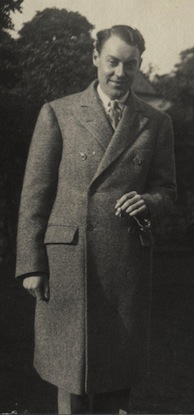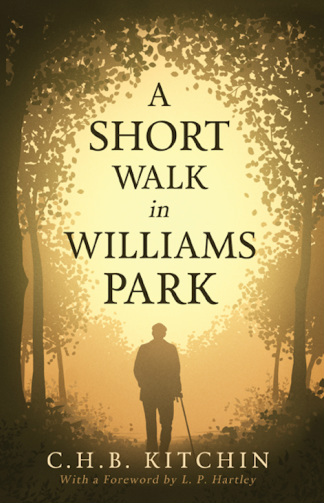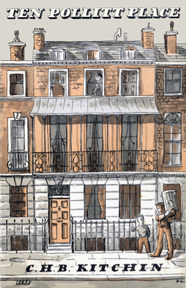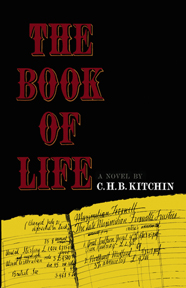|
BOOK DETAILS
Trade paper ISBN-13: 978-1941147023 List Price: $15.99 U.S. Pages: 120 Published: 2014 |
A Short Walk in Williams Park (1971)
C.H.B. Kitchin With a Foreword by L.P. Hartley Book Description
Francis Norton is an elderly bachelor who enjoys nothing better than spending a warm day outside in one of London’s parks. When one afternoon he innocently overhears the earnest conversation of two young lovers, Edward and Mirrie, whose relationship is complicated by Edward’s unhappy marriage to a drunken wife, Francis decides to interfere in an attempt to help the pair. But despite his good intentions, his matchmaking efforts have unexpected consequences, and he soon finds himself caught up in a complicated triangle involving blackmail, a mysterious death, and courtroom intrigue. Will Francis’s well-meaning manipulations lead to a happy ending for his two young friends, or will his meddling end in tragedy and disaster? Found among C.H.B. Kitchin’s papers after his death, A Short Walk in Williams Park was published posthumously in 1971. As L.P. Hartley writes in his Foreword, this short novel has the same distinction of style as Kitchin’s other acclaimed works and displays many of its author’s finest qualities. Republished here for the first time, Kitchin’s final book joins his Ten Pollitt Place (1957) and The Book of Life (1960), both also recently reprinted by Valancourt. |
reviews
“A writer who deserves to be admired and cherished.” – Francis King
“[O]ne of the most original novelists of his generation. His delicate, witty prose ably evokes the atmosphere of south London in which the story is set.” – British Book News
“[I]ntriguing . . . Short, firmly written, and agreeably unpretentious.” – The Guardian
“[O]ne of the most original novelists of his generation. His delicate, witty prose ably evokes the atmosphere of south London in which the story is set.” – British Book News
“[I]ntriguing . . . Short, firmly written, and agreeably unpretentious.” – The Guardian
ALSO AVAILABLE THROUGH ONLINE RETAILERS
MORE TITLES BY THIS AUTHOR
AUTHOR BIOGRAPHY

C.H.B. (Clifford Henry Benn) Kitchin was born in Yorkshire in 1895. He attended Exeter College, Oxford, and published his first book, a collection of poems, in 1919. His first novel, Streamers Waving, appeared in 1925, and he scored his first success with the mystery novel Death of My Aunt (1929), which has been frequently reprinted and translated into a number of foreign languages.
Kitchin was a man of many interests and talents, being called to the bar in 1924 and later amassing a small fortune in the stock market. He was also, at various times, a farmer and a schoolmaster, and his many talents included playing the piano, chess, and bridge. He was also an avid collector of antiques and objets d'art.
Kitchin was a lifelong friend of L. P. Hartley, with whose works Kitchin’s were often compared, and was also a friend and mentor to Francis King, who later acted as Kitchin’s literary executor. In his introduction to the Valancourt edition of Kitchin’s The Book of Life, King recalls meeting Kitchin after the two wrote fan letters to one another in 1958 that crossed in the mail: King had written in praise of Ten Pollitt Place, while Kitchin’s letter had expressed admiration for the younger novelist’s The Man on the Rock (1957). King wrote, ‘[B]y the time that I met him, his fate was that of many elderly, once famous writers in England. Instead of lead reviews, he now got two or three paragraphs at the bottom of a page. Increasingly critics would apply the dread word “veteran” to him, much to his annoyance.’ This frustration is echoed in his novel Ten Pollitt Place, where Kitchin portrays himself in the character of the aging novelist Justin Bray.
Kitchin, who was gay, lived with his partner Clive Preen, an accountant, from 1930 until Preen’s death in 1944. C.H.B. Kitchin died in 1967.
Kitchin was a man of many interests and talents, being called to the bar in 1924 and later amassing a small fortune in the stock market. He was also, at various times, a farmer and a schoolmaster, and his many talents included playing the piano, chess, and bridge. He was also an avid collector of antiques and objets d'art.
Kitchin was a lifelong friend of L. P. Hartley, with whose works Kitchin’s were often compared, and was also a friend and mentor to Francis King, who later acted as Kitchin’s literary executor. In his introduction to the Valancourt edition of Kitchin’s The Book of Life, King recalls meeting Kitchin after the two wrote fan letters to one another in 1958 that crossed in the mail: King had written in praise of Ten Pollitt Place, while Kitchin’s letter had expressed admiration for the younger novelist’s The Man on the Rock (1957). King wrote, ‘[B]y the time that I met him, his fate was that of many elderly, once famous writers in England. Instead of lead reviews, he now got two or three paragraphs at the bottom of a page. Increasingly critics would apply the dread word “veteran” to him, much to his annoyance.’ This frustration is echoed in his novel Ten Pollitt Place, where Kitchin portrays himself in the character of the aging novelist Justin Bray.
Kitchin, who was gay, lived with his partner Clive Preen, an accountant, from 1930 until Preen’s death in 1944. C.H.B. Kitchin died in 1967.





